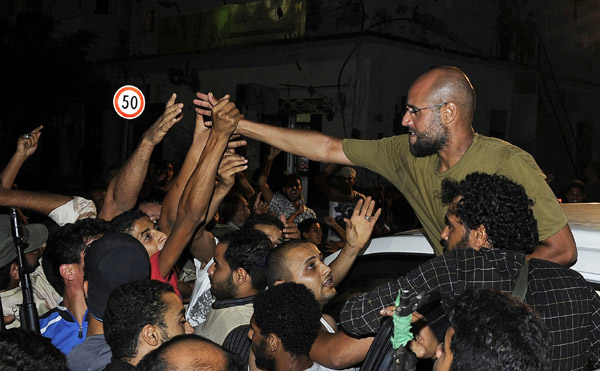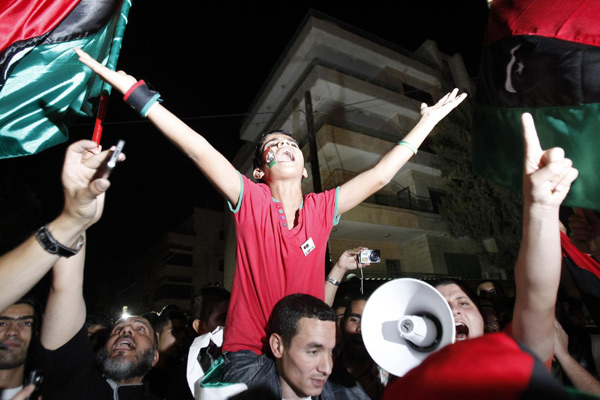Libyan rebels seek Gadhafi
|
 |
|
Saif Al-Islam, son of Muammar Gadhafi, greets supporters in Tripoli August 23, 2011. Saif told journalists that Libya, which has been largely overrun in the past 24 hours by rebel forces seeking to topple his father, was in fact in government hands and that Muammar Gadhafi was safe.[Photo/Agencies]
|
Tripoli, Libya - Tanks opened fire at rebels trying to storm Muammar Gadhafi's main compound in Tripoli on Monday, although the whereabouts of the longtime Libyan leader remained unknown a day after a lightning advance by opposition fighters who poured into the Libyan capital with surprising ease.
Libyan government tanks and snipers put up scattered resistance but there was little sign that the rebel offensive was meeting any coordinated opposition.
World leaders were in no doubt that, after six months of an often meandering revolt backed by NATO air power, the disparate and often fractious rebel alliance was about to take control of the North African country with its extensive oil reserves.
US President Barack Obama and other Western leaders urged Gadhafi to accept defeat and prepared to work with the rebels - though the future leadership of Libya still remains unclear.
|
 Libyans living in Jordan wave flags of the Kingdom of Libya during a protest against Libyan leader Muammar Gadhafi outside the Libyan embassy in Amman August 22, 2011. [Photo/Agencies] |
The EU, whose members had in recent years resolved disputes with Gadhafi in return for energy supplies, welcomed a "new era".
"We are witnessing the last moments of the Gadhafi regime," EU foreign affairs chief Catherine Ashton said on Monday.
She urged the rebels not to settle scores in blood and to respect human rights and move swiftly toward a new democracy.
South Africa, a leading power on the continent to which Gadhafi devoted much of Libya's wealth and influence, denied it had sent a plane for Gadhafi or was planning to shelter a leader who has been indicted for crimes against humanity by the International Criminal Court (ICC) in the Hague.
Sweden's Prime Minister Fredrik Reinfeldt said: "We are watching history." But he cited the bloody epilogue to the overthrow of Saddam Hussein in Iraq and warned: "There is a risk of revenge and uncontrollable violence."
Some analysts also warned of the risk of civil war in what has been the bloodiest campaign in the Arab spring.
The fall of Gadhafi will boost embattled opposition groups in other Middle East countries, notably Syria.
Franco Frattini, foreign minister of Libya's former colonial ruler Italy, said time has run out for Gadhafi.
Laila Jawad, 36, who works in a Tripoli nursery, said after the rebels arrived: "We are about to be delivered from the tyrant's rule. It's a new thing for me."
Rebel spokesman Mohammed Abdel-Rahman, who was in Tripoli, cautioned that while pockets of resistance remained and that as long as Gadhafi remains on the run the "danger is still there".
Clashes broke out early on Monday at Gadhafi's longtime command center known as Bab al-Aziziya when government tanks emerged from the complex and opened fire at rebels trying to get in, according to Abdel-Rahman and a neighbor.
Without the cause of fighting Gadhafi to unite them, the fighters from all walks of life must come up with an effective leadership to run a country suffering from factionalism, tribal rivalries and ethnic divisions.
Signs of trouble and disunity have already emerged long before the sweep into Tripoli.
Libyans are demanding, and are impatient for a bigger share of the country's oil wealth and want to see better schools and hospitals as well as more jobs.
The rebels are made up of different factions.
Many of them have been very critical of their comrades because they come from a different region in Libya or from a different tribe or ethnic group.
An Associated Press reporter at the nearby Rixos Hotel, where foreign journalists stay, could hear gunfire and loud explosions from the direction of the complex.
The rebels' top diplomat in London, Mahmud Nacua, said clashes were continuing in Tripoli, but opposition forces controlled 95 percent of the city. He vowed Gadhafi would be found, saying "the fighters will turn over every stone to find him".
Libyan rebels are negotiating with the ICC to arrange the handover of Gadhafi's son Saif al-Islam who was detained late on Sunday, al Arabiya TV reported on Monday without naming a source.
The ICC in June issued arrest warrants for Gadhafi, his son Saif and Libyan intelligence chief Abdullah al-Senussi on charges of crimes against humanity after the UN Security Council referred the Libyan situation to the court in February.
China says it respects the will of the Libyan people and hopes that the situation will stabilize, the Foreign Ministry said on Monday.
"China wishes to play a positive role in the reconstruction of Libya, along with the international community," the ministry said in a statement.
Mark Laffey, a senior lecturer at the School of Oriental and African studies at the University of London, said that the US, the UK and France will seek regional advice and input to help Libya overcome its problems.
"I suspect the optimal solution from the viewpoint of external powers would be something like what are seeing in Egypt, where a popular revolt is now being managed by the military - much to the relief of Israel."
Nobody knows what Gadhafi will do now, Ma Xiaolin, an expert on Middle East and African issues and a leading international correspondent, said.
"It is his last chance (to surrender)," he said on his Sina micro blog.
The major task now is to rebuild the country, Ma said.
Political reconstruction will be a priority in the new era if unrest is to be avoided, according to Zhang Xiaodong, a researcher with the West Asian and African Studies Institute at the Chinese Academy of Social Sciences.
"The possibility of internal insecurity cannot be excluded," he said.
People must lay down their weapons and accept a new political authority, Sir Richard Dalton, Associate Fellow at the Royal Institute of International Affairs in London, told China Daily.
"The victorious party has to refrain from any acts of revenge or punishment."
Agencies - China Daily



























